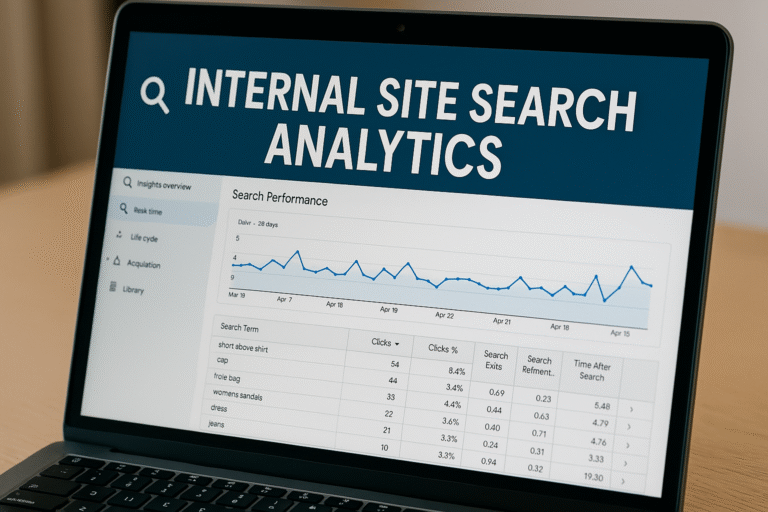As ecommerce businesses strive to understand and serve their customers better, one underutilized yet immensely valuable tool is internal site search analytics. Unlike general web analytics, which focuses on user behavior across your site, internal search analytics delves into what users are actively looking for within your website. This insight is powerful it reveals user intent in real time, offering a direct path to optimization.
From improving product discoverability to boosting conversion rates, internal site search analytics can reshape how you design, market, and scale your ecommerce platform. In this blog, we will explore the technical foundation of internal search analytics, its benefits, implementation methods, and how advanced tools can give you a competitive edge.
What Is Internal Site Search Analytics?
Internal site search analytics refers to the process of tracking, collecting, and analyzing search queries performed by users within a website’s search bar. It helps site owners understand:
- What users are searching for
- Which queries yield no results
- How search affects conversion rates
- How often search is used vs. browsing
These metrics go far beyond surface-level data. They can be used to optimize search algorithms, tweak merchandising strategies, and fill content or product gaps.
Key Metrics in Internal Search Analytics
To get actionable insights, you need to understand and measure the right metrics:
- Search Frequency: Percentage of sessions that include a search.
- Search Refinements: When users reformulate queries to find better results.
- Search Exit Rate: Users who leave after a search without further interaction.
- Zero-Results Rate: Queries that yield no search results.
- Conversion Rate from Search: How often users convert after searching.
- Click-Through Rate (CTR): How often users click on search result items.
Tracking these over time highlights performance bottlenecks and optimization opportunities.
Why Internal Search Analytics Matters in Ecommerce
1. Understand User Intent
When a user uses your internal search, they’re telling you what they want. Analyzing this intent can uncover:
- High-demand products
- Seasonal trends
- Missing inventory or poor categorization
2. Improve UX and Conversion Rates
Search analytics help identify poor-performing queries, enabling improvements in:
- Query handling logic
- Product tagging and metadata
- Search ranking algorithms
3. Optimize Inventory and Merchandising
Consistent searches with no results indicate what customers want but can’t find either because it’s out of stock or not listed at all.
4. Enhance SEO and PPC Targeting
Popular internal searches can inspire:
- Targeted landing pages
- Better-performing ad campaigns
- Improved product descriptions for organic visibility
Technical Implementation of Internal Search Analytics
1. Using Google Analytics 4 (GA4)
In GA4, internal search tracking can be implemented by enabling site search tracking via the event model. GA4 logs search queries as parameters (e.g., search_term). Key steps:
- Identify the query parameter (e.g.,
?q=product) - Configure GA4 to capture that parameter
- Analyze metrics like engagement rate and conversions from search
2. Server-Side Logging
If you have a custom search engine, log search queries and results on the server. Store:
- Timestamp
- Query string
- Result count
- Clicked product ID
- Session/user ID (anonymized)
Use this data to build dashboards and apply machine learning for:
- Query classification
- Personalization
- Ranking optimization
Expertrec, offers real-time search query tracking, click heatmaps, and AI-powered analytics for ecommerce platforms.
Is It Worth Using Internal Site Search Analytics?
Absolutely. Businesses often underestimate the value of their on-site search box. Consider the following:
- Visitors who use search are 2-3 times more likely to convert.
- Poor search experience can result in higher bounce rates and lost revenue.
- Tracking internal queries highlights SEO and product catalog gaps.
Investing in internal search analytics helps you proactively address friction points and deliver a smoother user journey.
Alternatives & Limitations
While GA4 and native tools are free, they come with drawbacks:
- Limited visualization and search-specific KPIs
- Delayed data processing
- No advanced AI-driven query insights
Expertrec provides an out-of-the-box analytics suite optimized for ecommerce, offering advanced features with minimal setup.
Why Choose Expertrec for Internal Search Analytics?
Expertrec combines AI search technology with deep analytics:
- Real-time dashboards with zero-typing suggestions
- Query categorization by intent (informational, navigational, transactional)
- Integrated product performance tracking
- Heatmaps and CTR breakdowns
- Easy plug-in setup for Shopify, WooCommerce, and Magento
You can track how users interact with the search box, what they click on, and where they drop off. This enables continuous optimization without manual effort.
Final Thoughts
Internal site search analytics is no longer optional for ecommerce success. It is a strategic asset that reveals your users’ desires and frustrations in their own words. By properly analyzing these insights and acting on them, businesses can dramatically increase relevance, conversions, and customer satisfaction.
If you’re seeking a robust, AI-powered search solution that also offers deep analytics, Expertrec is worth considering.
FAQs
Internal site search analytics involves tracking and analyzing what users search for within your website to improve user experience and conversion rates.
Q2. How can I track internal searches in GA4?
You can enable search tracking in GA4 by capturing query parameters (e.g., q= or search=) and analyzing the search_term event in your reports.
Q3. Why do ecommerce sites need internal search analytics?
Because search users show strong intent. Tracking what they look for helps in improving product listings, SEO, and UX.
Q4. Can Expertrec provide search analytics?
Yes, Expertrec offers built-in dashboards, AI-driven query grouping, click tracking, and more, tailored for ecommerce platforms.
Q5. What’s the difference between GA4 and Expertrec analytics?
GA4 is generic and may require custom setups. Expertrec is built for ecommerce search and offers specific, actionable insights with minimal setup.




